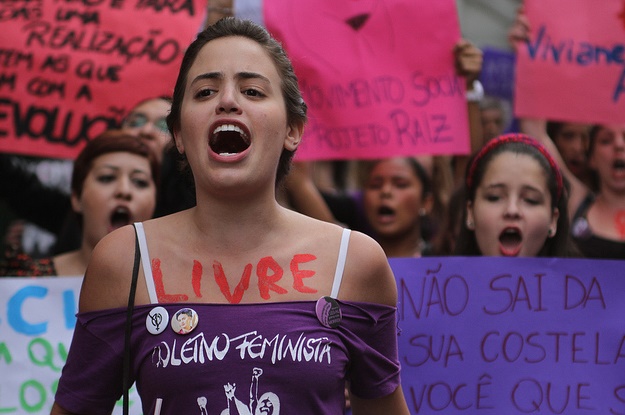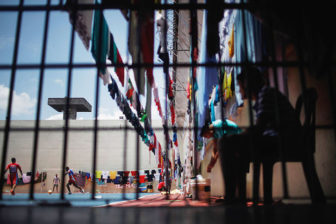Nine years old. That’s the average age that, according to Brazilian NGO Think Olga, Brazilian females are first subjected to sexual harassment. Think Olga uncovered the startling number as part of a Twitter campaign called #primeiroassedio (#firstharassment), which encourages women to use social media to recount their first experience of sexual assault or harassment. To date, some 3,000 women in Brazil have come forward.
Sexual harassment and violence against women is pervasive across countries, borders and cultures – from catcalling to sexual gestures to physical assault. In Brazil, Think Olga is pushing back by using social media to try to eliminate the stigma against speaking up. The #primeiroassedio campaign began after Juliana de Faria, a journalist and the founder of Think Olga, read lewd tweets targeting Valentina Shulz, a 12-year-old contestant on Brazil’s MasterChef Junior television series. Upset by the commentary, de Faria tweeted her own experiences about being harassed as a child, and other women started following suit.
#Primeiroassedio is not the first social media movement from the think tank. In 2013, they created Chega de Fiu Fiu (Stop Catcalling), which aims to create safer cities for women by offering a means for them to share incidents of sexual harassment in public places, using a map to pinpoint where the harassment occurred.
In Brazil, as in many other countries, sexual harassment can often be disguised as an unavoidable part of the culture. “Sexual harassment in public places was part of everyday life and was looked upon as something that was not violent, but that was part of being a man,” de Faria told AQ.
But these sentiments are slowly shifting, in part because social media has given people a place to address the issue more openly. “As more women share their stories, we can see how frequently [harassment occurs] … when women share their stories – the horrors that they lived – we get a better gauge on what’s really happening,” said de Faria.
While harassment is a global phenomenon, Brazil finds itself squarely in the middle of the problem. In 2001, the country’s legislature criminalized sexual harassment as part of a project authored by Congresswoman Iara Bernardi. But Brazil still places among the countries with the highest rates of violence against women in the world. In one study of 83 countries, Brazil had the fifth-highest rate of murder of women, with nearly 5 deaths per 100,000. The total number and rate of female homicides has dramatically increased over the past three decades.
And women still are reluctant to come forward about abuse. Only an estimated 10 percent of incidents of rape of women are reported to the police, and even processing claims of harassment can prove difficult to see through.
“As [harassment] is a crime where there is embarrassment of the victim, many [women] desist from carrying out the complaint and end up giving up on processing the aggressor. And usually the aggressors have a repetitive behavior, repeating their intrusive behaviors numerous times,” Gisele Truzzi, a Brazilian attorney specializing in digital law and legal counsel to Think Olga, told AQ.
Both Truzzi and de Faria see the fact that women continue to shy away from making formal complaints as one of the biggest challenges to overcoming the problem. While better training for police and other professionals that treat victims of sexual harassment is important, both agree that continuing awareness campaigns, like #primeiroassedio, can change the societal perceptions on sexual harassment, and ultimately save lives.
“Social media networks connect women. When we are able to connect we can see that we have very similar stories,” said de Faria. “Women continue to be publicly harassed, because it’s a long process, but I think we have started to make people aware [of the problem].”







